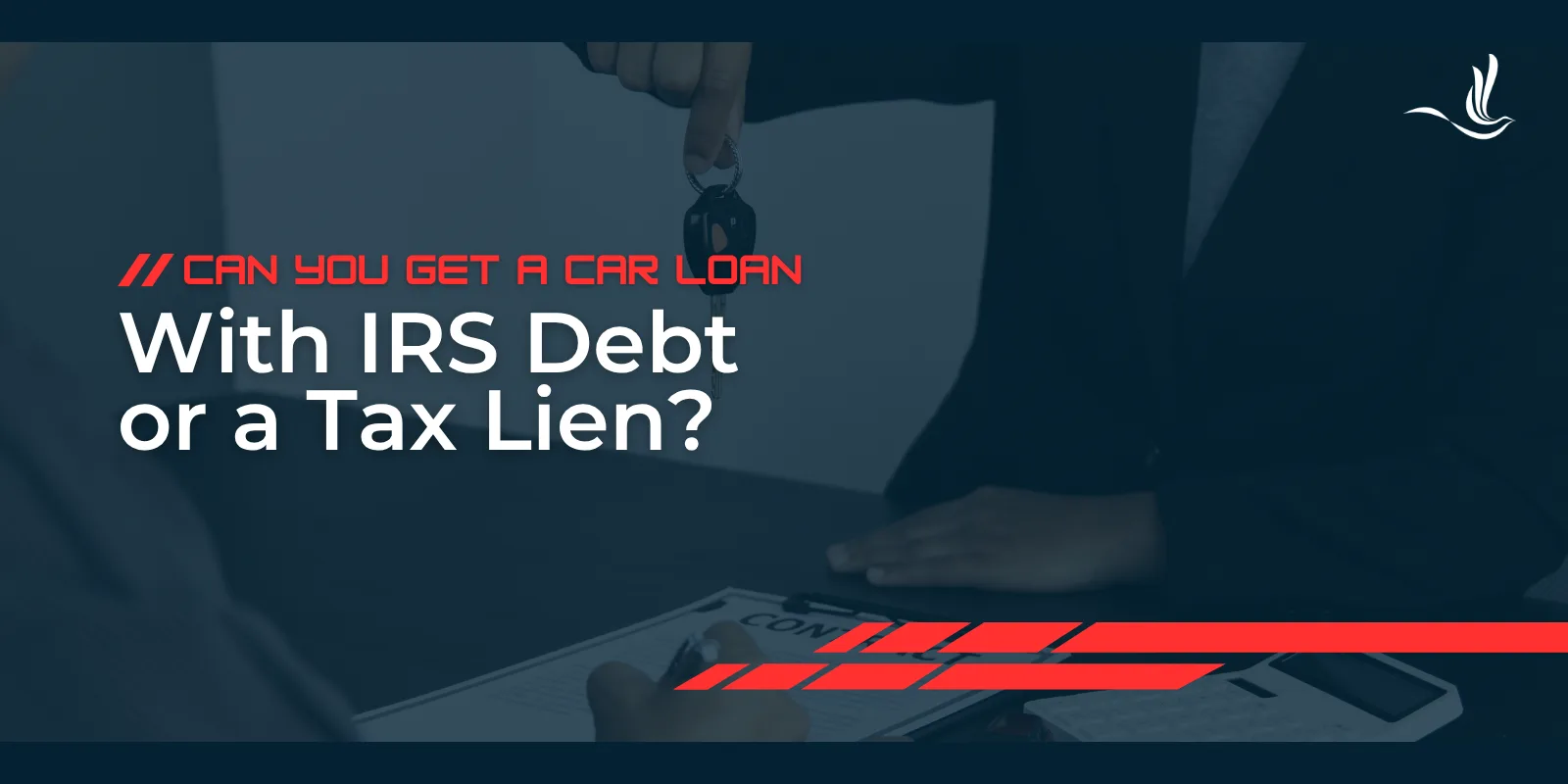Key Takeaways:
- You can get a car loan with IRS debt or a tax lien but expect more scrutiny and less favorable terms.
- IRS payment plans can improve your chances by showing lenders you’re actively resolving your debt.
- Tax liens don’t appear on credit reports anymore, but lenders still check public records and may factor them into approval decisions.
- You may face higher interest rates and down payment requirements due to perceived risk.
- Strengthening other areas of your financial profile, like credit utilization and income, can offset the impact of tax debt.
- Waiting to resolve IRS issues before applying may result in better loan options, but it depends on how urgently you need a vehicle.
If you’re struggling with IRS debt or have a federal tax lien on your record, you may be wondering how it will affect your ability to finance a vehicle. The short answer? It’s still possible to get a car loan. However, it won’t be as straightforward. Lenders take a close look at your creditworthiness, and IRS debt or a tax lien can raise red flags that lead to higher interest rates, stricter terms, or outright denials. However, there are ways to improve your odds. In this guide, we’ll break down how IRS debt and tax liens impact your auto financing options, what lenders look for, and how you can still move forward with confidence.
Understanding IRS Debt and Tax Liens
Before we discuss the loan process, it’s important to understand what IRS debt and tax liens are and how they affect your financial profile.
What Is IRS Debt?
IRS debt occurs when you owe taxes to the federal government that you haven’t paid in full by the due date. This can include unpaid income tax, self-employment tax, penalties, and interest. For example, let’s say you’re self-employed and didn’t make quarterly estimated payments. At tax time, you find out you owe $7,500. If you can’t pay the full amount and don’t set up a payment plan, the IRS may take further action. IRS debt doesn’t automatically ruin your financial standing, but the consequences can snowball. Over time, if left unresolved, this debt can lead to enforcement actions like liens and levies.
What Is a Tax Lien?
A federal tax lien is the government’s legal claim against your property when you neglect or fail to pay a tax debt. This can include real estate, personal assets, and financial accounts. It’s a powerful collection tool. Once the IRS files a Notice of Federal Tax Lien, the lien becomes public record. While tax liens no longer appear on your credit report as of 2018, they still matter significantly to lenders.
For example, if the IRS files a lien for $15,000, it may not show up in your credit score calculation, but lenders who do a public records search will see it and may hesitate to extend credit.
Do Tax Liens Still Show Up on Credit Reports?
No. In 2018, the three major credit bureaus (Experian, Equifax, and TransUnion) stopped including tax liens in consumer credit reports. This was part of a broader move to eliminate inaccurate or unverifiable public record data. However, this doesn’t mean lenders ignore them. Many lenders still check public databases or ask about liens in their applications, especially for large loans like mortgages or auto loans.
Can You Get Approved for a Car Loan With IRS Debt?
Yes, but the IRS debt can make it more difficult, especially if the lender views it as a sign of financial instability.
How Lenders Evaluate Your Risk
When reviewing a car loan application, lenders typically look at:
- Income and employment history
- Debt-to-income (DTI) ratio
- Payment history on other loans
Even if your tax debt isn’t reflected in your credit score, it may influence a lender’s decision if it’s significant or if it indicates poor money management. So, a borrower with a 670 credit score, $55,000 annual income, and $8,000 in IRS debt may be flagged as a higher risk than someone with similar financials and no debt to the government.
IRS Payment Plans May Help
If you’ve entered into a formal IRS installment agreement, that shows lenders you’re actively resolving your debt. This can make a big difference in how they view your application. Lenders want to see that you’re taking responsibility. Submitting proof of an active payment plan, along with on-time payments, may be enough to keep the loan approval process moving.
Can You Get a Car Loan With a Tax Lien?
A tax lien can make getting a car loan more complicated, but it doesn’t necessarily mean you’ll be denied. It depends on the lender, the size of the lien, and your overall financial profile.
Why Tax Liens Matter to Lenders
Even though tax liens no longer impact your credit score directly, lenders still take them seriously. A tax lien:
- Signals unresolved financial obligations
- Could lead to asset seizure if unpaid
- Indicates greater lending risk
Lenders are wary of competing with the IRS for payment. If you default, and the IRS enforces the lien, it could compromise your ability to repay the car loan.
Manual Underwriting and Subprime Financing
In cases where you have a tax lien, your loan may be sent to manual underwriting. This is a process where a real person reviews your full financial picture rather than relying only on algorithms.
Manual underwriting might result in:
- A request for additional documentation (like IRS payment agreements)
- Longer approval timelines
Alternatively, you may be directed to subprime auto lenders who specialize in higher-risk borrowers. These lenders often approve people with tax issues, but usually at the cost of much higher interest rates.
How Tax Liens Affect Loan Terms and Interest Rates
Even if you get approved for an auto loan while carrying IRS debt or a tax lien, the terms of your loan are likely to be less favorable.
Expect Higher Interest Rates
Most borrowers with tax liens fall into the “non-prime” or “subprime” credit category, even if their credit scores are technically okay. Lenders may charge higher interest to offset the risk. A borrower with no liens and a 680 credit score may receive a 7% APR. The same borrower, with a tax lien, could be offered 11–14% APR.
Larger Down Payment Requirements
Lenders may also ask for a bigger down payment. This reduces the loan amount and risk exposure. For example, instead of 10% down on a $20,000 car ($2,000), you may be asked to put down 20–30% ($4,000–$6,000). If you can’t meet that, approval may be denied.
Tips for Getting a Car Loan With a Tax Lien or IRS Debt
All is not lost if you’re dealing with tax issues. These strategies can help improve your approval chances and reduce borrowing costs.
Strengthen Other Parts of Your Application
Offset the negative weight of your IRS debt by improving other financial factors:
- Pay off credit card debt to lower your utilization
- Dispute any inaccurate credit report items
- Increase your income with side work, if possible
- Avoid applying for other loans or credit cards just before applying
Show Proof of IRS Communication
Being transparent and prepared goes a long way. Submit:
- Records of on-time payments
- A brief explanation letter outlining how you’re managing the debt
Lenders appreciate proactive borrowers who take their financial obligations seriously.
Shop Around for the Right Lender
Not all lenders treat IRS debt or liens the same. Consider:
- Credit unions, which often have more flexible underwriting
- Online lenders that specialize in bad or challenged credit
- In-house dealership financing, though terms may vary widely
Take the time to compare rates, terms, and reputation. Don’t automatically accept the first offer you receive.
Should You Wait to Buy a Car Until You Resolve Your IRS Debt?
It’s a valid question and the answer depends on your circumstances.
Consider Your Transportation Needs
If your current vehicle is unreliable or you need one for work, waiting may not be an option. In that case:
- Buy used to reduce loan amounts
- Put down as much cash as possible
- Focus on affordability, not just approval
Long-Term Benefits of Resolving Debt First
If your transportation needs aren’t urgent, paying off or resolving your tax debt could open better financing opportunities down the road.
- Improved financial flexibility
For some borrowers, waiting 6–12 months to clean up IRS issues can save thousands in interest and stress.
Frequently Asked Questions
Can I get a car loan with an IRS tax lien?
Yes, you can still get a car loan with an IRS tax lien, but it may be harder to qualify and you’ll likely face higher interest rates or stricter loan terms. Lenders may require proof that you’re addressing the lien, such as an IRS payment plan.
Can I get a car loan if I owe back taxes?
Yes, owing back taxes doesn’t automatically disqualify you from getting a car loan. However, lenders may view the debt as a financial risk, especially if you’re not on a repayment plan with the IRS.
Does IRS debt show up on a credit report?
IRS debt itself does not appear on your credit report, but if the IRS files a tax lien, that used to be reported until 2018. While liens no longer show up on credit reports, many lenders still check public records and factor tax debt into their decision.
Will a dealership buy a car with a lien on it?
Yes, many dealerships will buy a car with a lien on it, but they’ll typically pay off the remaining loan balance as part of the transaction. You’ll need to provide the lender’s payoff amount and work with both parties to transfer the title.
Tax Help for Those Dealing with Tax Liens
So, can you get a car loan with IRS debt or a tax lien? Yes, but you’ll need to be strategic and prepared. Tax debt and liens don’t automatically disqualify you from financing a vehicle, but they do create hurdles. Lenders may view you as a higher risk, meaning you could face higher rates, stricter conditions, or fewer options. The good news is that many people with tax issues still secure car loans by proving they’re actively resolving their debt and demonstrating financial responsibility elsewhere. Optima Tax Relief is the nation’s leading tax resolution firm with over a decade of experience helping taxpayers with tough tax situations.
If You Need Tax Help, Contact Us Today for a Free Consultation
Publisher: Source link











